Answer these simple questions and we will find you the BEST prices
Which type of solar quotes do you need?
It only takes 30 seconds
100% free with no obligation

Tell us what you need to find a matching specialist

Get free quotes from professionals near you

Compare offers and choose the one that best matches your need
- whatcost.co.uk
- Home Insulation
- Wall Insulation
- Cavity Wall Insulation
- Cavity Wall Insulation Injection
Cavity Wall Insulation Injection: What Is It, Types & More

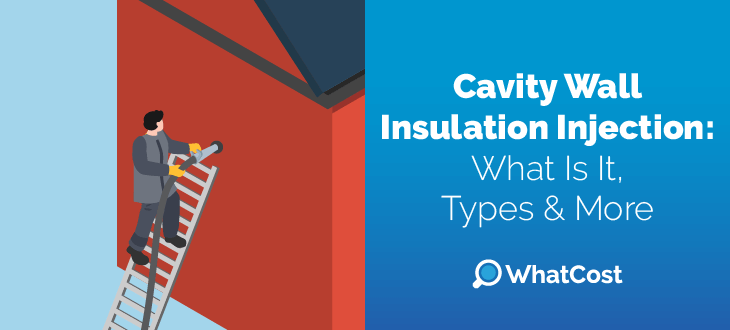
- Cavity wall injection insulation can help reduce heat loss by 33%, leading to energy bill savings of
- £110 to £470 per year.
- Cavity wall insulation injection is a method of insulation by injecting material into the cavity gap between the inner and outer walls.
- Injected cavity wall insulation works by drilling 25mm holes to the exterior walls and injecting the chosen material into the gap. After it is completed, it is covered with mortar to protect the insulation.
Cavity wall insulation injection is one of the most effective ways to insulate your cavity walls. With 71% of homes in the UK having cavity walls, injection insulation can help reduce heat loss by up to 33% and save you between £110 to £470 every year on your energy bills.
In order to gain the benefits of this insulation method, it is essential to understand what cavity wall insulation injection is. Luckily, this WhatCost guide will cover all you need to know about injected cavity wall insulation, from its pros and cons to the costs. With this knowledge, you can help improve your home’s comfort and make an informed decision that suits your needs and budget.
The best way to determine the right insulation method for your home is by working alongside a trusted insulation specialist who can recommend the most effective solution. Here at WhatCost, we make it easy by offering up to three free quotes from top insulation professionals in your area. Fill out our 30-second form to get started. Click below to learn more.
- Describe your needs
- Get free quotes
- Choose the best offer
It only takes 30 seconds



How does injected cavity wall insulation work?
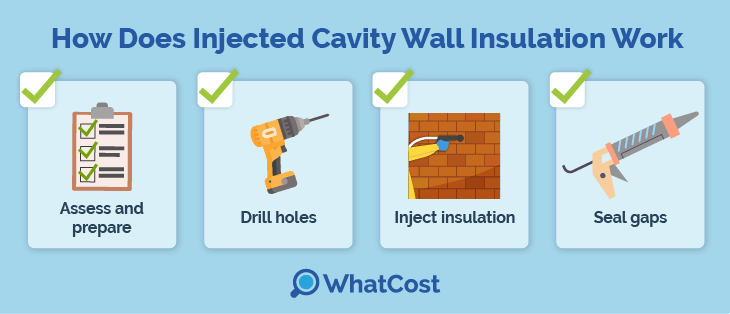
Injected cavity wall insulation is a method of insulating the hollow space (cavity) between the inner and outer walls of your home. Professionals drill 25 mm holes in the exterior wall and filling the gap between the external and internal walls using the chosen material. Here is how to install cavity wall insulation injection:
- Assessment and preparation: A professional insulation installer will survey the property to ensure your walls are suitable for cavity wall insulation injection. Any issues, such as cracks or damp will be addressed before installation.
- Drilling holes: Once the walls have been prepared, the installer begins drilling 25mm holes at intervals of 1mm apart to ensure even coverage of the insulation material.
- Wall insulation injection: The chosen insulation is injected into the holes using specialised equipment.
- Sealing the gaps: After the insulation has been injected, the installer will seal the holes with mortar to match the brickwork of your home.
The entire process usually takes between two to three hours depending on your property.If you’re wondering "how long does cavity wall insulation last?", properly installed insulation can last between 20 to 100 years, depending on the material used. Most insulation types are designed to be a long-term solution, with many productions backed by a 25-year guarantee if you opt for a CIGA-certified insulation installer.
Cavity wall insulation injection types
When deciding which cavity wall insulation injection to choose, consider factors such as cost, energy efficiency, sustainability, and durability to ensure the best fit for your home.
The R-value of an insulation material shows how well it is at resisting the flow of heat. The higher the R-value, the better the insulation.
Mineral wool
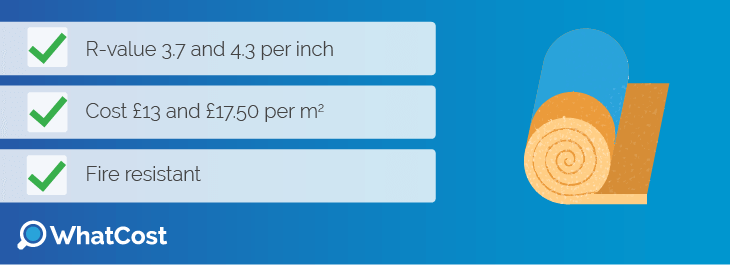
Mineral wool is a dense, fibre-based insulation material that provides excellent thermal insulation and soundproofing. Made from rock or glass fibre, it can cost between £13 and £17.50 per square meter. Rockwool cavity wall insulation boasts an impressive R-value of 3.7 to 4.3 per inch, outperforming glass alternatives in efficiency.
One of its standout features is exceptional fire resistance, making it one of the safest insulation choices for homes. Additionally, its moisture-resistant properties help prevent mould and mildew growth. However, due to its density and weight, it may not be suitable for cavity walls with weaker structural integrity.
Polystyrene beads
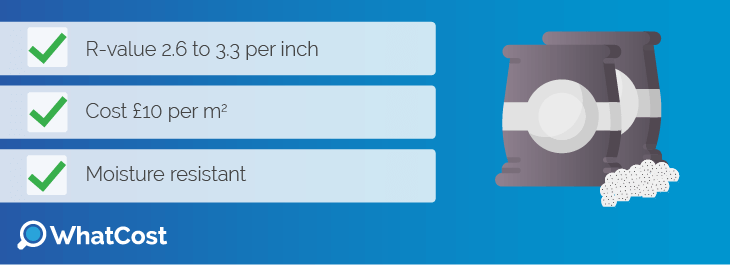
Polystyrene beads are small, lightweight beads that are easy to inject into cavity walls ensuring even coverage and minimising gaps that could lead to heat loss. With an R-value of 2.6 to 3.3 per inch and an average cost of £10 per square meter, EPS beads provide reliable thermal insulation. They are water-resistant which reduces the risk of damp.
One of their biggest advantages is long-term stability, as they resist settling over time, maintaining effective insulation. However, as a petroleum-based product, they have environmental drawbacks, including harmful emissions during production. Additionally, poor installation of this insulation can lead to cavity wall insulation beads leaking which can lead to costly repairs and poor energy performance.
Polyurethane foam
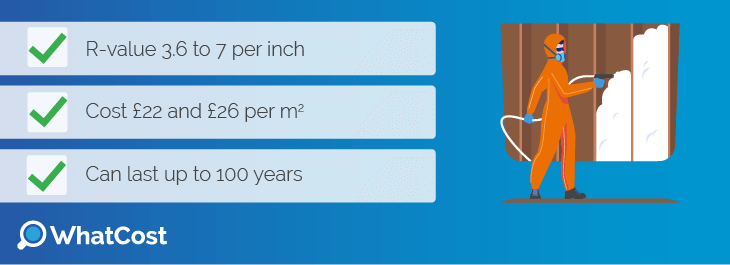
Polyurethane foam cavity wall insulation is applied in liquid form, which then expands and fills the entire cavity. This creates an airtight seal which minimises heat loss and acts as a barrier against moisture, reducing the risk of mould and mildew growth. However, sufficient ventilation is essential, as poor ventilation with this material can cause a buildup of condensation.
Polyurethane foam has a high R-value ranging from 3.6 to 7 per inch, making it one of the best cavity wall insulation injection materials available in the UK. Its cost can range from £22 to £26 per square meter, making it a costly choice. While expensive, this material can last up to 100 years if installed correctly, meaning its durability will offset the initial cost.
Cavity wall insulation injection cost
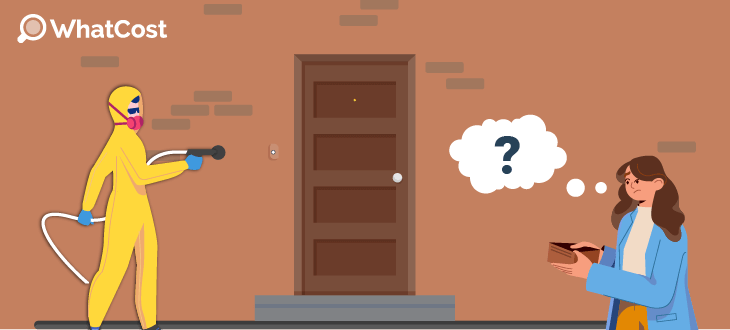
On average, the cost of cavity wall insulation injection can range between £550 to £4,300, according to Energy Saving Trust. The price of injection insulation can be expensive and is influenced by several factors, such as your location, your property type and the material you choose.
Typically, labour will cost around £250 per person per day; if you have a larger property, this will increase the time spent on installation, as well as material costs. It is essential to consider all these factors into your budget. Here are the average costs of the best insulation injection materials:
| Injection material | Average cost per m2 |
|---|---|
| Mineral wool | £13 to £17.50 per m2 |
| Polystyrene beads | £10 per m2 |
| Polyurethane foam | £22 to £26 per m2 |
While injected cavity wall insulation can be costly, there are many grant schemes available to help offset these costs. To be eligible and apply for these grants, you must work alongside a trusted certified insulation installer. Here at WhatCost, we can connect you with the best specialists in your area. By filling out our quick 30-second form, we can provide you with up to three free quotes. Click below to learn more.
- Describe your needs
- Get free quotes
- Choose the best offer
It only takes 30 seconds



What are the pros and cons of cavity wall injection insulation?
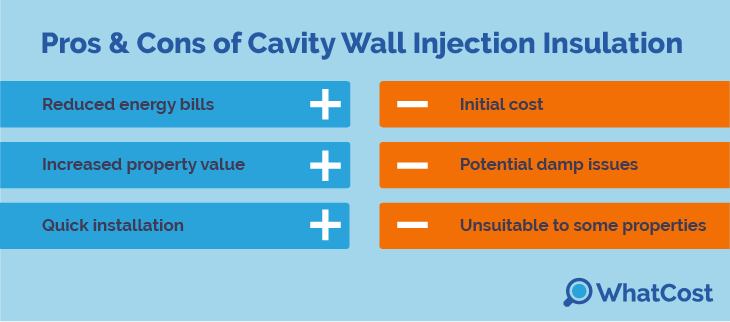
Cavity wall insulation injection offers several benefits to you and your home. However, it is essential to weigh out the pros and cons so that you can make an informed decision that will benefit you in the long run.
Pros
- Reduced energy bills: Wall insulation injection can save you between £110 to £470 annually on your energy bills, depending on your property type and insulation material.
- Improved comfort: Cavity wall insulation helps maintain a stable indoor temperature and reduces heat loss by up to 33%.
- Increased property value: By improving your home’s EPC rating, you can make your property more desirable to potential buyers, potentially increasing its market value by up to 14%.
- Reduced carbon footprint: Lowering your energy consumption with injection insulation can help reduce your carbon footprint between 310 to 1,600 kgCO2 annually.
- Quick installation: Cavity wall injection installation is quick to install typically, completed within two to three hours, ensuring minimal disruption to your home and daily routine.
Cons
- Potential damp issues: Poorly installed insulation can lead to cavity wall insulation dampness, leading to the growth of mould and mildew and potentially causing structural damage.
- Initial cost: The cost of insulation injection can be high, ranging between £1,100 to £4,600, depending on your property size and the material used.
- Settling of materials: Over time, certain materials can settle, resulting in gaps in the insulation, which can affect its effectiveness.
- Not suitable for all properties: Wall insulation injection is not suitable for all home types. Properties with solid walls, timber-framed structures, or existing structural issues may require alternative insulation methods.
Is cavity wall insulation injection the right choice for your home?
Cavity wall insulation injection can be an amazing solution for you and your home as it provides excellent thermal efficiency, improves your home’s comfort, saves money on your energy bills and can even boost your home’s property value!
To reap the benefits of cavity wall insulation injection, it is essential to work with insulation specialists who ensure proper installation and prevent any issues from arising, such as the potential for material settlement and damp problems. Finding the right insulation specialist is, therefore, essential.
Here at WhatCost, we can save you the hassle of spending hours researching the right insulation specialist for your needs and budget. By filling out our 30-second form, we can provide you with up to three free no-obligation quotes. Click below to learn more about this offer!
- Describe your needs
- Get free quotes
- Choose the best offer
It only takes 30 seconds



FAQ
Properly installed injected cavity wall insulation can last between 20 to 100 years, depending on the material you choose.
Professionals drill 25mm holes into the external wall at 1m intervals, then inject the insulation to evenly fill the cavity. Afterwards, they seal the holes with mortar to match the brickwork.
Yes, injection foam is worth it as it provides excellent thermal efficiency by expanding and filling the entire cavity gap, creating an airtight seal. While it is an expensive choice, it can last up to 100 years, which helps offset the initial costs through energy savings.
Yes, injection insulation can be expensive, depending on your location, property type, and material chosen. However, there are grant schemes available to help offset the cost.

Caoimhe is an experienced content writer and researcher who is passionate about providing accessible information to every reader. With a background in English literature and Sociology, she combines the two disciplines to create cohesive, well-thought-out, and well-informed pieces.
- Cavity Wall Insulation Injection: What Is It, Types & More
- How does injected cavity wall insulation work?
- Cavity wall insulation injection types
- Cavity wall insulation injection cost
- What are the pros and cons of cavity wall injection insulation?
- Is cavity wall insulation injection the right choice for your home?
- FAQ
